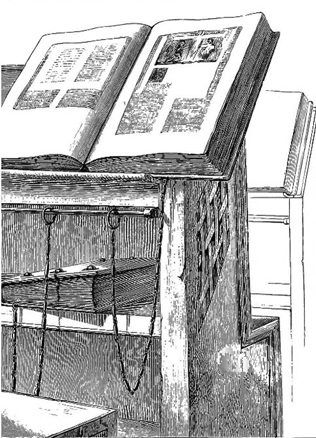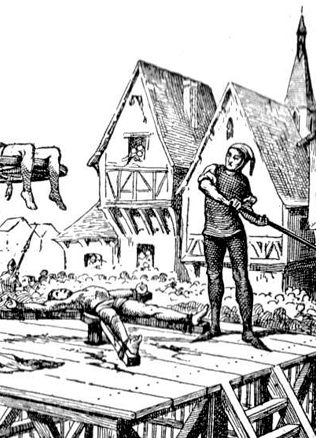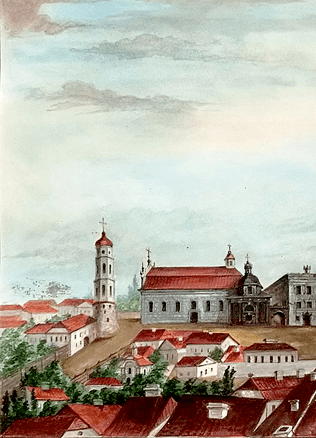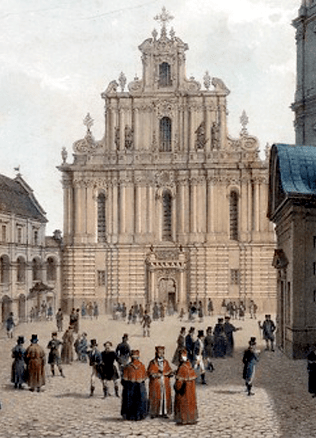Politics in writing: why were instructions of the sejmiks necessary?
The sejmiks (dietines) of the districts (pol. powiat), introduced in the Grand Duchy of Lithuania following the example of the Kingdom of Poland, several years prior to the 1569 Union of Lublin, embodied the noble democracy. Every nobleman of the district had the right to take part in the sejmiks, to express his opinion, to vote on all the issues, to elect and be elected to the Sejm, the Supreme Tribunal of the Grand Duchy of Lithuania and various offices. There the nobility discussed the decisions put forward by the Ruler, voted on taxes, considered the affairs of the state: from war to peace, estate and religious rights to the request of the individual persons to intercede for them, to restore justice or award them for their merits to the state.
The instructions of the sejmiks provide the greatest amount of information about the attitude of the nobility towards the foreign policy, the state governing and taxes, problems of the districts and the entire country. The instruction of the sejmik is written authorisations of the nobility of the district to the envoys elected to the Sejm. Though the Second Statute of the Grand Duchy of Lithuania (1566), which introduced sejmiks, does not mention sejmiks yet, the Third Statute (1588) clearly indicated that envoys had to consider the affairs raised by the Ruler and the district nobility at the Sejm, “which shall be commissioned to them at the sejmik and presented in the sealed instructions of the citizens of that district”. In some districts instructions of the Sejmiks were public documents entered in the court books of the castle, and each nobleman could obtain their excerpts from court.
To assure the envoy’s mission – the appeal to morality and threats
The envoys could not ignore the will of the nobility expressed at the sejmik, and the instruction as its written expression. For example, when making a speech at the general sejmik of Slonim in 1597 to which the envoys from all over the Grand Duchy of Lithuania gathered to coordinate the positions prior the Sejm of the Grand Duchy of Lithuania was convened, the Tivun (a royal official / administrator) of Vilnius district and envoy Jan Pac underlined that contrary to the senators who could freely express their opinion, the envoys had to say what they were commissioned to say by the noblemen. And Grodno standart-bearer and envoy Jokūbas Kuncevičius refused to consider the issue of assuring religious peace because it was not mentioned in the instruction of the sejmik of his district.
“
“We oblige their Graces Lords Envoys with faith and honesty not to assume anything burdening but what is allowed in the instruction.”
The instructions of the sejmik often contained a clear prescription that it was obligatory to follow them. The instruction of Upytė district of 1621 demanded that in an especially expressive manner: “We oblige their Graces Lords Envoys with faith and honesty not to assume anything burdening but what is allowed in the instruction. And if the Commonwealth badly needs something, we ask the envoys to appeal to us again, assuring our brothers that we shall not neglect them. And if something that contradicts our decisions is decided, we do not want to accept it.” The envoys were not always required to blindly follow all the proposals or requirements laid down in the instructions. The sejmiks restricted the envoys’ freedom of action in the instruction indicating stricter on what issues they had limited authorisations and could not deviate from the will of the sejmics. Most often restricted authorisations related to taxation. Attempts were made not to permit the Sejm to impose a larger taxation burden than it was decided at the sejmik or assure the right of the final confirmation of the taxes adopted at the Sejm in the so-called relational sejmiks in which the envoys informed the nobility of the districts about the decisions made at the Sejm. Thereby restricted authorisations the instructions limited the will of the envoys of the sejmiks on other issues too. For example, in 1608, the Sejmik of Minsk forbade the envoys to consider any other issues as long as all the participants in Zebrzydowski’s Rokosz (Pol. Rokosz Zebrzydowskiego) (an armed uprising of the nobility against the king, supressed a year ago) has been released from judicial responsibility. In 1611, the instruction of the same district permitted the envoys to consider other affairs at the Sejm only after the demolishers of the Evangelical Reformed Church in Vilnius had been punished.
It was impossible to carry out all the requirements laid down in the instructions, especially as long as the right of “liberum veto” did not become prevalent – the right to block adoption of laws and decision by one vote. Therefore, the envoys of the districts often found themselves stuck between the hammer of the Sejm and the anvil of the sejmiks.
“
The envoys of the districts often found themselves stuck between the hammer of the Sejm and the anvil of the sejmiks.
In 1595, at the Sejm of Krakow, the envoys of Poland and the Grand Duchy of Lithuania clashed over appointment of a Pole as the Bishop of Vilnius. The Chancellor of the Grand Duchy of Lithuania Lew Sapieha, who watched futile attempts made by the envoys of the Grand Duchy of Lithuania to implement the requirement of the GDL districts to consider other issues only after a citizen of the Grand Duchy of Lithuania had been appointed Vilnius Bishop, commented as follows: “I see that it is easy to write an instruction to the envoy at home but how much work it takes to carry it out here, in the Sejm.”
“
“I see that it is easy to write an instruction to the envoy at home but how much work it takes to carry it out here, in the Sejm.”
In 1627, one of the two envoys of Grodno district did not dare to arrive at the sejmik of the district to present the decisions of the former Sejm because he felt what the reaction of the nobility would be after finding out that he had failed to oppose the decision on the land tax. His apprehensions were correct because the second envoy, upon his arrival to give an account, was nearly stoned. In the same year the noblemen of Navahrudak threatened their envoy to the convention in Warsaw, demanding him in advance not to sign any decisions there; among the noblemen there were such who threatened him with a sword.”
The Noble’s democracy and the art of instruction writing
The Noble’s democracy had to become established. The Sejmiks of a district, at least at the very beginning, did not always reflect the moods and opinion of the nobility of the districts. It was already at the Sejm of the Union of Lublin that one envoy of the Grand Duchy of Lithuania could not help it and told his colleagues from Poland how the sejmiks were conducted in his district: “The standart-bearer and the Elder of the district arrive, write the instruction and then go round the houses of the noblemen and tell them to sign, and tell to hit anyone who refuses with sticks.”. But gradually the sejmiks became the place of a search for real, often heated discussion and a universal agreement – the political ideal of the Nobles’ democracy. When opinions differed, the noblemen argued at the sejmik for all four days permitted by the Third Statute of the Grand Duchy of Lithuania for the Sejmik to continue. If they managed to come to an agreement or find a compromise (the nobility usually managed to do that at least until the turmoil in the middle of the 17th century and the epoch of the right of “liberum veto” that followed it), these agreements were recorded in detail and reproachfully from the legal point of view in the instructions by their authors. Most often it was the officials of the district courts (castle court and land court) who wrote down these instructions. They formed a small but active nucleus of the public life of the district, organised the work of sejmiks, were elected envoys to the Sejms, congresses and the Supreme Tribunal of the Grand Duchy of Lithuania. The officials were literate and legally educated to express the will of the nobility that gathered at the Sejm by means of a fluent legal document. One of them was Jonas Mikalojus Stankevičius, a clerk of the Samogitian land court, repeatedly elected an envoy of Samogitia to the Sejms and a deputy to the Supreme Tribunal of the Grand Duchy of Lithuania. In 1653, King Jan Casimir appointed him to a high office of a senior clerk of the Grand Duchy of Lithuania. He was the author of the instructions of the Samogitian Sejmik written in 1630 according to which “I have to write instructions ex officio”.
“
“Freedom is more important than life.”
This surviving instruction testifies to the fact that Jonas Mikalojus Stankevičius performed his duties perfectly. Stankevičius generalised the heated discussions that were held during the Sejmik about the abuses in the Supreme Tribunal of the Grand Duchy of Lithuania and its imperfect work in a detailed programme of the reform, and decorated the instruction in a non-standard way with a passionate introduction on the theme of patriotism: “Everyone, who takes a more attentive look, will have to admit by all means that the very eternal Providence arranged so that by its will love of each nation of its motherland in the hearts of people burns so strongly that they are not only used to cherish its beauty by their wealth but seek to see its security, assured as strongly as possible, they want their chests to be its borders and insurmountable strongholds. Many times in happiness and misery, different nations showed that to their motherland, and often, when it was necessary they gave not only their wealth but also their blood. And indeed, it is not surprising at all, because in their hearts they carried the following well cut in words: “Freedom is more important than life”.
At the end of the 16th – in the first half of the 17th century instructions of the sejmiks became a political active instrument used consistently by the nobility to affect the activity of the Sejm of the Commonwealth of the Two Nations. The significance attached to the instructions and their contents testify to the fact that at that time the culture of the Nobles’ democracy was being formed in the Grand Duchy of Lithuania covering wide strata of the nobility.
Artūras Vasiliauskas



